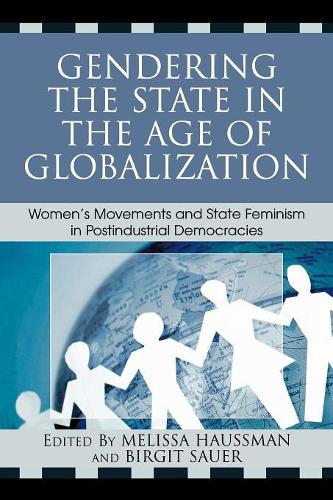
Gendering the State in the Age of Globalization: Women's Movements and State Feminism in Postindustrial Democracies
(Paperback)
Publishing Details
Gendering the State in the Age of Globalization: Women's Movements and State Feminism in Postindustrial Democracies
By (Author) Melissa Haussman
Edited by Birgit Sauer
Bloomsbury Publishing PLC
Rowman & Littlefield Publishers
8th May 2007
United States
Classifications
Tertiary Education
Non Fiction
Feminism and feminist theory
Political activism / Political engagement
323.34
Physical Properties
Paperback
402
Width 154mm, Height 230mm, Spine 29mm
576g
Description
Gendering the State is a ground-breaking collection of studies that examines the efforts of women in countries all over the world to frame public policy debates on nationally critical issues in gendered terms. This is the latest volume in the Research Network on Gender and the State (RNGS) collaborative studies. Using the RNGS model of women's movement and women's policy actor strategies to influence public policy debates and state response, the book looks at data gathered from ten European countries (including Finland and Sweden), plus Japan, Australia, Canada, and the United States from the 1990s to today.
The overall study is grouped into three distinct patterns of state change: state downsizingparticularly in social policy areas (Canada, Finland, the Netherlands, the United States, and Spain); expansion of state activities into previously less-regulated areas (Austria, France, Germany, and Sweden); and transformationoften constitutionally basedof representative structures (Australia, Belgium, Italy, Japan, and the United Kingdom). Examination of these patterns reveals the impact of the changes in state structures and national priorities on the effectiveness and ability of women's movement actors in achieving their goals.
Reviews
A major contribution to our understanding of the impact of the women's movement on state policy in the period since the 1990s and, in particular, on how we can systematically examine this question. Gendering the State in the Age of Globalization compares the impact of women's policy agencies and the women's movement on current major state policies in fourteen countries. Individual country chapters provide genuinely comparable data (something of enormous value but not always achieved in collections) and, from this, the editors rigorously test their hypotheses in a rich concluding chapter. A book to read and to keep. -- Caroline Andrew, University of Ottawa
This volume is welcome because it analyzes the relationship between women's movements and public policy debates across a range of countries, sometimes in surprising ways. Some of these issues have not been examined previously in an empirical, gender-sensitive analysis. -- Donley T. Studlar, West Virginia University
Author Bio
Melissa Haussman is associate professor in the Department of Political Science at Carleton University.
Birgit Sauer is professor of political science at the University of Vienna.
